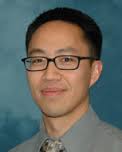|
|
|
Meet the BOD: Dr. Albert Lam |
|
Albert Lam, MD
CALTCM President (2020-2022)
Albert Lam studied Gerontology and Bioethics at the University of Southern California (USC), received his medical degree from USC, completed his residency in Internal Medicine at Kaiser Los Angeles - University of California at Los Angeles (UCLA) and Geriatrics at UCLA. He is current Chair of the Department of Geriatrics at the Palo Alto Foundation Medical Group and is passionate about building healthcare systems that align incentives for best care. He is honored to serve on the board and as President of CALTCM and hopes to elevate the voices of clinical experts as healthcare looks to improve the post acute and long term care experience of our elders.
Meet The CALTCM Board of Directors:
Albert Lam, MD
(Interviewed January 2016)

Dr. Lam studied Gerontology at the University of Southern California and continued on to study medicine at the same university. He completed his residency in internal medicine at the Kaiser Permanente Los Angeles-UCLA program and he completed his fellowship in Geriatrics at the University of California Los Angeles.
|
|
Read more...
|
|
|
The Problem of Persistent Pain |
|
by Timothy Gieseke MD, CMD
In recent years, I have noticed a dramatic increase in admissions to my PA-LTC (Post Acute-Long Term Care) practice of patients with persistent non-cancer pain managed with high dose opioids . Despite this intervention, many of these patients still report their pain intensity as a 10. In fact a pain audit of patients with persistent pain in one of my facilities recently found that 1/3rd of their patients with persistent pain had reported a 10 pain intensity in the prior month.
|
|
Read more...
|
|
Resources for Improving Dementia Care |
|
by Elizabeth Gomes, MS, OTR/LCalifornia Culture Change Coalition
In 2012 the Partnership to Improve Dementia Care for Nursing Home Patients was formed to carry out the CMS mandate to reduce the inappropriate use of antipsychotics and improve person-centered care for individuals with dementia. This initiative was led by the California Culture Change Coalition and funded by a grant from CMS with a contract with the California Department of Public Health. To fulfill the goals of this program, the Partnership formed four separate workgroups: Improving Dementia Care Education, Consumer Awareness, Informed Consent and Enforcement. Representatives from many partner agencies across the state and a wide variety of professionals have joined together and worked in these groups to achieve our aim of significantly improving care and quality of life.
|
|
Read more...
|
|
by Timothy Gieseke MD, CMDFormer Chair Education Committee
As a senior clinician, I have been spending more time reflecting on my life and medical career. As clinicians, we are privileged to become an important part of the lives of our patients, families, and staff. Part of this work is making future memories, but also part of it is facilitating the recall of past events and how that relates to the present and future. We all bring our background to this process.
I grew up in a singing family where Christmas caroling was an integral part of the “Joy” of the season. My love and respect for seniors in part reflects this background, since my maternal grandparents raised my siblings and I in a small town in Missouri for parts of the early 50’s as my father and mother recovered from TB and post strep glomerulonephritis. I remember walking with my grandparents and other relatives to various homes of neighbors and frail seniors bringing familiar Christmas carols of “Good Tidings & Joy”.
|
|
Read more...
|
|
The Lost is Found – A Thanksgiving of Reconciliation |
The story of one “unbefriended” resident’s reunification with familyby Deborah Wolff-Baker MSN, ACHPN, FNP-BC
On a single night in January 2013, there were 610,042 homeless people in the United States. Sixty-nine percent of them stayed in sheltered locations and 31 percent were found to be in unsheltered locations such as streets, abandoned buildings, and cars. According to the report entitled: “The State of Homelessness in America 2014”, nearly 137,000 of these homeless persons reside in California. The most notable difference between older and younger homeless adults is the older adults’ compromised health status. One study found that 85% of homeless persons over the age 50 reported at least one chronic medical condition. Homeless adults between ages 50 and 62 often have healthcare needs similar to those of people who are 10 to 20 years older. They often end up in nursing homes due to a lack of other options. About 12 years ago the American Bar Association’s commission on law and aging estimated that 4% of Long Term Care residents are “unbefriended” – incapacitated and alone. Chances are your facility may have one or more of these residents.
|
|
Read more...
|
|
|
|
|
<< first < Prev 31 32 33 34 35 36 37 38 39 40 Next > last >>
|
|
Page 36 of 78 |